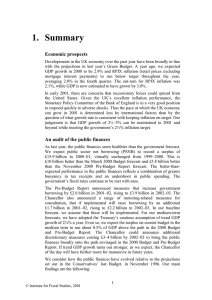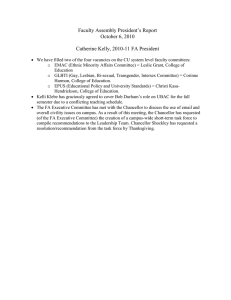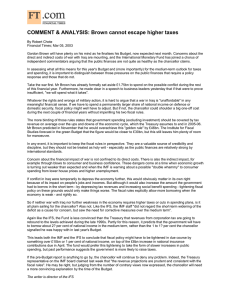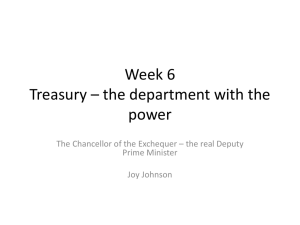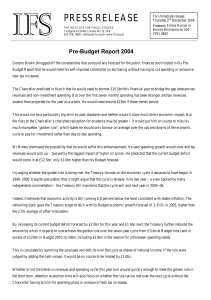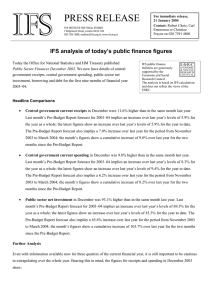IFS PRESS RELEASE
advertisement
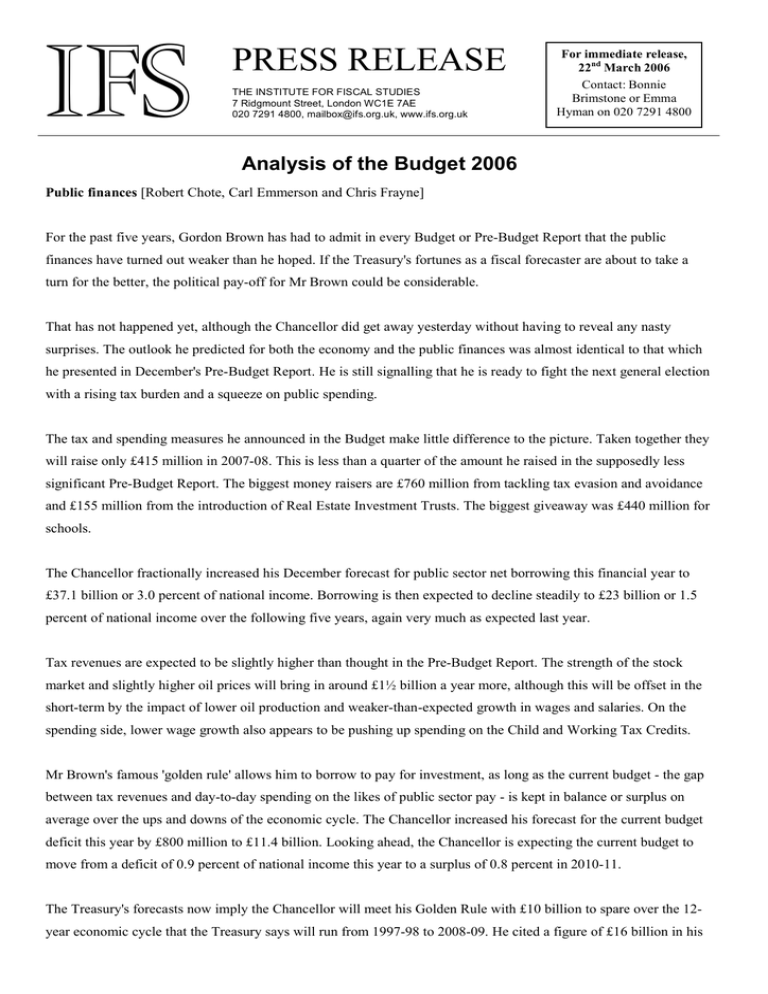
IFS PRESS RELEASE THE INSTITUTE FOR FISCAL STUDIES 7 Ridgmount Street, London WC1E 7AE 020 7291 4800, mailbox@ifs.org.uk, www.ifs.org.uk For immediate release, 22nd March 2006 Contact: Bonnie Brimstone or Emma Hyman on 020 7291 4800 Analysis of the Budget 2006 Public finances [Robert Chote, Carl Emmerson and Chris Frayne] For the past five years, Gordon Brown has had to admit in every Budget or Pre-Budget Report that the public finances have turned out weaker than he hoped. If the Treasury's fortunes as a fiscal forecaster are about to take a turn for the better, the political pay-off for Mr Brown could be considerable. That has not happened yet, although the Chancellor did get away yesterday without having to reveal any nasty surprises. The outlook he predicted for both the economy and the public finances was almost identical to that which he presented in December's Pre-Budget Report. He is still signalling that he is ready to fight the next general election with a rising tax burden and a squeeze on public spending. The tax and spending measures he announced in the Budget make little difference to the picture. Taken together they will raise only £415 million in 2007-08. This is less than a quarter of the amount he raised in the supposedly less significant Pre-Budget Report. The biggest money raisers are £760 million from tackling tax evasion and avoidance and £155 million from the introduction of Real Estate Investment Trusts. The biggest giveaway was £440 million for schools. The Chancellor fractionally increased his December forecast for public sector net borrowing this financial year to £37.1 billion or 3.0 percent of national income. Borrowing is then expected to decline steadily to £23 billion or 1.5 percent of national income over the following five years, again very much as expected last year. Tax revenues are expected to be slightly higher than thought in the Pre-Budget Report. The strength of the stock market and slightly higher oil prices will bring in around £1½ billion a year more, although this will be offset in the short-term by the impact of lower oil production and weaker-than-expected growth in wages and salaries. On the spending side, lower wage growth also appears to be pushing up spending on the Child and Working Tax Credits. Mr Brown's famous 'golden rule' allows him to borrow to pay for investment, as long as the current budget - the gap between tax revenues and day-to-day spending on the likes of public sector pay - is kept in balance or surplus on average over the ups and downs of the economic cycle. The Chancellor increased his forecast for the current budget deficit this year by £800 million to £11.4 billion. Looking ahead, the Chancellor is expecting the current budget to move from a deficit of 0.9 percent of national income this year to a surplus of 0.8 percent in 2010-11. The Treasury's forecasts now imply the Chancellor will meet his Golden Rule with £10 billion to spare over the 12year economic cycle that the Treasury says will run from 1997-98 to 2008-09. He cited a figure of £16 billion in his speech by assuming that he will not need to spend his contingency reserve for unexpected events. But yesterday he needed to find an extra 1 billion for next year for international commitments including Iraq and Afghanistan, so this may be optimistic. This £10 billion cushion is slightly smaller than the £12.7 billion he had at the time of the Pre-Budget Report. Any fiscal forecast is uncertain, especially over three years. Given the Treasury's past forecasting performance its best guess implies a 55 to 60 percent chance of meeting the golden rule in the absence of further policy changes over the remaining three years of the economic cycle. The Chancellor also has fractionally less room for manoeuvre against his second key goal, the sustainable investment rule. This requires him to keep public sector net debt below 40 percent of national income. The Chancellor now expects public sector net debt to level off at 38.4 percent of national income, up from 38.2 percent in the Pre-Budget Report. Almost half the improvement in the current budget balance over the next five years is expected to come about automatically as economic growth moves back above its long-term average over the next three years. This will bring in extra tax revenues and reduce spending on benefit payments. The Treasury is sticking by its December growth forecasts of 2-2½ percent this year and 2¾-3¼ percent in 2007 and 2008. The growth forecast for this year is in line with the predictions of outside experts. But the City scribblers are less convinced that the economy can sustain growth as strong as the Treasury hopes thereafter without pushing up inflation. Fortunately for Mr Brown, the Bank of England seems happy with growth returning to 3 percent or so. Although the Treasury is sticking with its growth forecasts, it has slightly changed its estimates of the amount of spare capacity in the economy. This determines how much of the deficit in any given year is attributed to temporary 'cyclical' factors and how much to the underlying strength of the public finances. The Treasury now estimates that activity in the economy is running 1.2 percent below the level consistent with stable inflation this year. This 'output gap' is expected to widen to 1.4 percent next year and then to all but disappear over the following two years. This implies that the Treasury is expecting a 'structural' improvement in the budget balance of 0.7 percent of national income (about £8.5 billion) next year, followed by a further 0.3 percent in 2007-08 and little thereafter. Whether the improvement in the current budget materialises as the Chancellor hopes thus depends on two questions. First, whether there is as much spare capacity in the economy as the Treasury thinks? Second, whether the structural improvement over the next couple of years will be as strong as it believes? This could depend significantly on the strength of tax revenues from the City and North Sea oil companies. The other key factor will be whether Mr Brown is happy to stick with the squeeze on public spending that he has pencilled in for the years covered by the 2007 Comprehensive Spending Review, for which planning is already underway in Whitehall. This implies spending growing by just 1.9 percent a year after inflation over the three years beginning in 2008-09, presumably spanning the next general election. Given the Government's commitments to health, cutting child poverty, and overseas aid, these tentative plans already suggested that some departments would face real cuts in their budgets. Mr Brown confirmed this yesterday, announcing that the Home Office budget would be frozen in real terms and that the Department for Work and Pensions and three smaller departments would see real cuts of 5% a year over the period of the spending review. Other ministers are doubtless nervous too. Meanwhile he raised expectations of a generous settlement for schools, announcing an increase in capital spending through to 2010-11 and setting the goal of raising overall spending per pupil in state schools to its 2005 level in private schools - but without a timescale. The projected squeeze on spending and the increase in taxes announced in the Pre-Budget Report mean that we can be much more confident than we were a year ago that the public finances will improve broadly as the Chancellor expects. Yesterday's forecasts suggest that the run of consistently overoptimistic fiscal predictions that we have seen from the Treasury over the last five years may now be coming to an end. If we now enter a period of pleasant fiscal surprises, this would give the Chancellor room to loosen the prospective squeeze on spending or be more generous on taxes. That could be a very welcome boost as he comes to fight the next general election. Measures directly affecting households [Stuart Adam and Mike Brewer] The state of the public finances meant that Gordon Brown had little new money to use for tax cuts or spending measures to help his usual favoured groups. Indeed, one might be forgiven for thinking that the Chancellor has mixed up the Budget with the past year's Pre-Budget Report: in last December's Pre-Budget Report, the Chancellor gave away nearly £800m to pensioners, and announced substantial changes to the way that the child and working tax credits are administered, using some of the money raised by a tax rise on North Sea oil companies. In yesterday's Budget, only small measures were announced: parents gained slightly through higher tax credits and more tax-free childcare vouchers, and motorists will gain from a temporary freeze in fuel duties. One measure which did not appear in the Budget documentation because it had already been pencilled in to the public finance forecasts was that the payments to pensioners to help pay their bills in the last two winters will not be repeated in winter 2006. Families with children There were small measures to help families with children. Given recent news that the Government had missed albeit narrowly its target to cut child poverty by one quarter by 2004, one might have expected some indication of how the Government thinks it can meet its target for 2010, particularly as meeting the target for 2010 requires child poverty to fall by half as much again in the next 6 years as it has in the past 6 years. However, all that was announced was that the child element of the child tax credit will be increased in line with earnings for the rest of the Parliament, a measure which benefits roughly the poorest half of families with children. While sounding impressive, such a measure is relatively inexpensive only costing £400m a year by 2010 compared to the £8bn increase in total financial support for children since 1997 and by itself will only preserve the current levels of child poverty, according to ongoing work by IFS forecasting child poverty on current government policies The Chancellor also announced a rise, from £50 to £55 a week, in the amount of childcare vouchers employers can give out free of income tax. Such a move could save higher-rate-tax-paying parents just over £100 a year, but only where employers think the scheme worth operating: employees of Her Majesty's Revenue and Customs the government department that designed the scheme being among those whose employers think the scheme too complicated to justify implementing. Motorists For motorists, the Chancellor again postponed any increase of fuel duties until September, citing high and volatile oil prices. However, in the past two years, the rise due in September has itself been postponed, so fuel duties have been frozen since October 2003, a dramatic change from the first few years of the Labour Government, where fuel duties rose by 6 per cent per year above inflation. The environmental incentives in vehicle excise duty (VED) were strengthened, with the Chancellor increasing the difference in the rates between the least polluting cars some of whom will pay no VED at all and the most polluting, with the top rate rising to £210 a year. 50% of cars will pay the same or lower VED under the new scheme, and the change overall is broadly revenue-neutral. There were few unexpected announcements for other duties, with air passenger duty and those on spirits, sparkling wine and cider frozen, and rises in line with inflation for beer, non-sparkling wine and tobacco. Pensioners In December's Pre-Budget Report, the Chancellor confirmed that the winter fuel allowance for pensioners in this Parliament would be as generous as that of the past few years, at £200 for pensioners aged under 80 and £300 for others. In the past two winters, though, the Government has paid additional support to pensioners to cover bills. Crucially, yesterday's Budget did not extend these temporary payments to winter 2006, so pensioners will get payments of up to £200 less next winter than they have in the previous two years. ENDS Notes to editors: 1. IFS analysis will be presented at a lunchtime briefing on 23rd March 2006, 1pm – 2.30pm. Presentation slides will be available to download after the event: http://www.ifs.org.uk/budgets/budget2006/index.php
